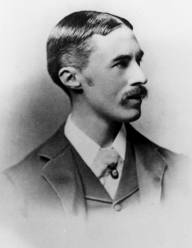 Alfred Edward Housman was born in a village in rural Shropshire, England in 1859. As a student at Oxford1, he distinguished2 himself as a promising3 scholar of classics, though crises of a personal nature caused him to fail his final exams. Housman was determined4 to overcome this failing. When not working at the British Patent office Housman wrote scholarly articles, and published many of them to very high regard from those in academic circles. He was invited to teach at the University of London as a professor of Latin, and soon stepped up to Cambridge University, to retire to the life of a shy academic. He published only two volumes of poetry --A Shropshire Lad in 1898 and Last Poems in 1922 -- yet these were instantly and enormously popular. However successful he was, the tone of his poems remained that of the Latin poets he admired: that life is short and often, inexplicably5, comes to a bad end.
Alfred Edward Housman was born in a village in rural Shropshire, England in 1859. As a student at Oxford1, he distinguished2 himself as a promising3 scholar of classics, though crises of a personal nature caused him to fail his final exams. Housman was determined4 to overcome this failing. When not working at the British Patent office Housman wrote scholarly articles, and published many of them to very high regard from those in academic circles. He was invited to teach at the University of London as a professor of Latin, and soon stepped up to Cambridge University, to retire to the life of a shy academic. He published only two volumes of poetry --A Shropshire Lad in 1898 and Last Poems in 1922 -- yet these were instantly and enormously popular. However successful he was, the tone of his poems remained that of the Latin poets he admired: that life is short and often, inexplicably5, comes to a bad end.
When I Was One-and-Twenty
When I was one-and-twenty
I heard a wise man say,
"Give crowns and pounds and guineas
But not your heart away;
Give pearls away and rubies
But keep your fancy free."
But I was one-and-twenty,
No use to talk to me.
When I was one-and-twenty
I heard him say again,
"The heart out of the bosom6
Was never given in vain;
'Tis paid with sighs a-plenty
And sold for endless rue7."
And I am two-and-twenty,
And oh, 'tis true, 'tis true.
当我二十一岁时
当我二十一岁时,
我听聪明人言语,
“金子银子均可给,
不可把真心相与;
珍珠宝石均可给,
个人爱好不可失。”
我已年方二十一,
再说与我复何益。
当我二十一岁时,
我听他又在言语,
“你真心一朝相与,
也绝不会白给,
得到的是无尽哀叹,
换回来无限愁思。”
我已二十有二岁
啊,言之有理,有理。
解释:诗人以轻松而又有讽刺意味的诗句描述了一个青年恋爱时的感受。聪明人不要他轻易去谈恋爱以免招致无穷的失望与苦恼,他未听劝告,二十一岁就谈情说爱起来,结果,正如聪明人所说的,才一年光景(到了二十二岁),他已感到无穷的烦恼。
Look Not in My Eyes
Look not in my eyes, for fear
They mirror true the sight I see,
And there you find your face too clear
And love it and be lost like me,
One the long nights through must lie
Spent in star-defeated sighs,
But why should you as well as I
Perish? gaze not in my eyes.
A Grecian lad, as I hear tell,
One that many loved in vain,
Looked into a forest well
And never looked away again,
There, when the turf in springtime flowers,
With downward eye and gazes sad,
Stands amid the glancing showers
A jonquil, not a Grecian lad.
请别看我的眼睛,
我怕它映出我看的那付倩影。
当你看到那清晰的面貌,
你会爱上它,跟我一样神魂不定。
在漫漫黑夜里躺着,消瘦枯槁,
听任命运的煎熬。
你我何苦要毁灭?
请别看我的眼睛。
我听说有位希腊少年,
许多姑娘爱他也都枉然,
森林里池水中他看到自己容颜,
变成了水仙花,什么东西也不再看。
每当春天草地上白花盛开,
之间一株水仙花而不是希腊少年,
伫立在迷蒙细雨之间,
它眼睛低垂,神情伤感。
解释:诗人告诫一位他所爱的姑娘不要像一位希腊少年那样。 因为他在森林中一池清水里看见自己的影子而顾影自怜,对于许多爱他的姑娘他都不理,结果被神所罚,变成一株水仙花。 所以诗人要这位姑娘不要看诗人的眼睛,免得在眼睛中看到她自己的美丽影子而顾影自怜遭到同样的命运。
 收听单词发音
收听单词发音 
